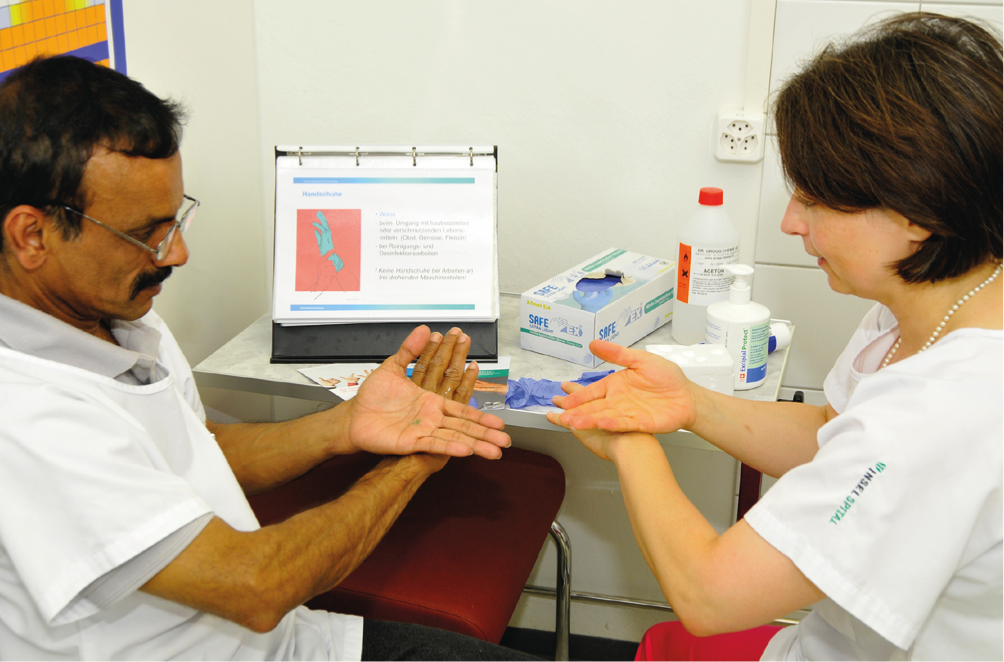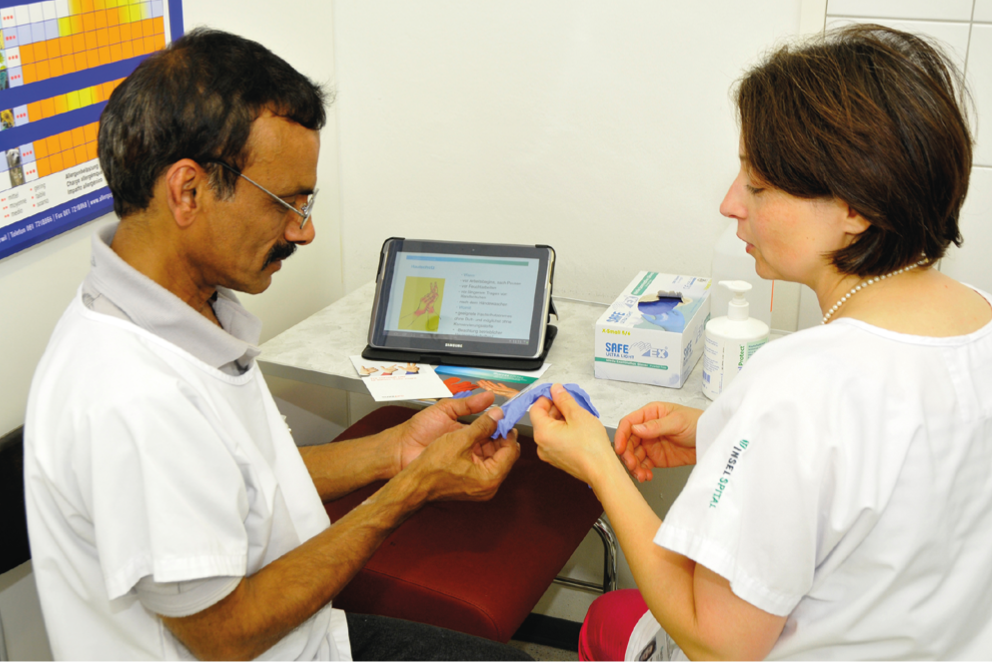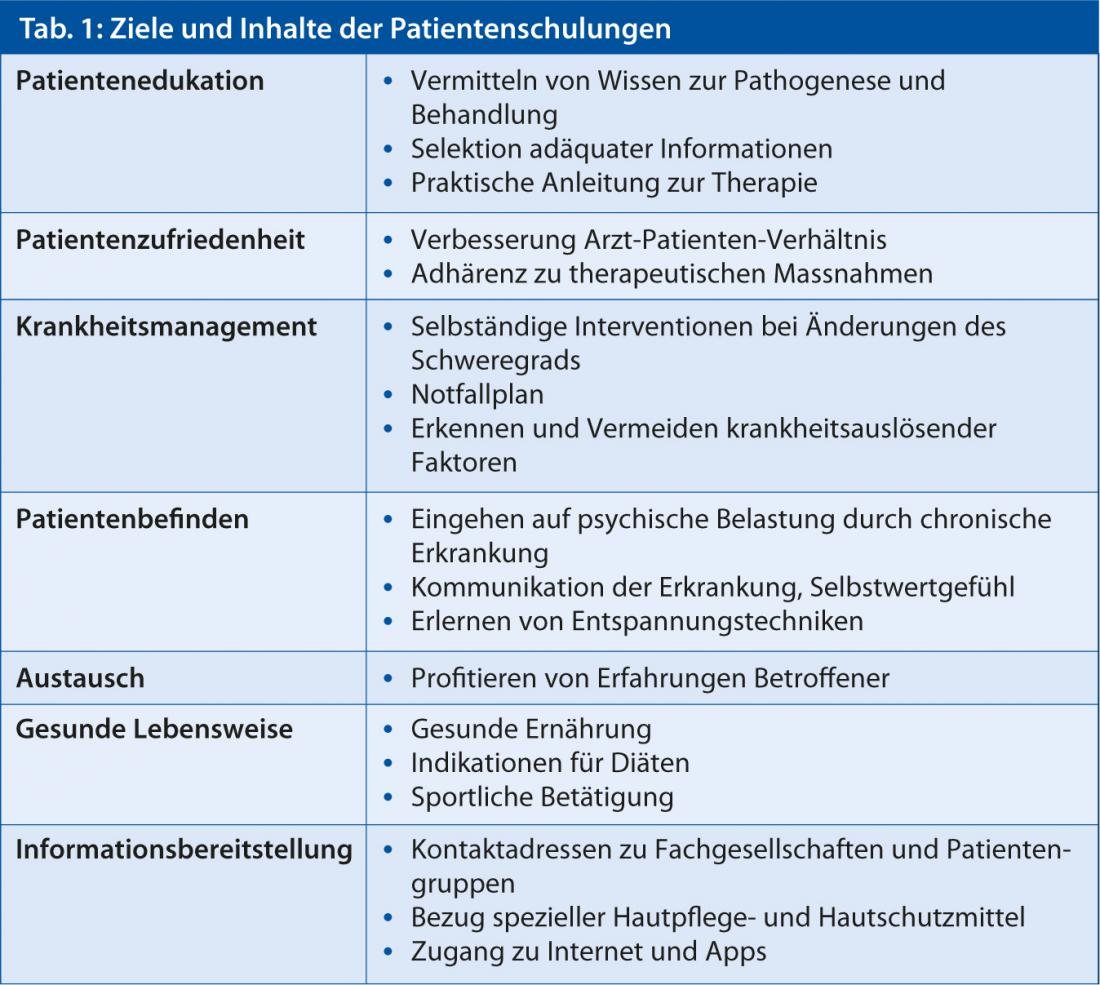The University Department of Dermatology at Inselspital acts as a tertiary center in patient care, offering a variety of specialized consultations, surgical interventions, aesthetic and cosmetic dermatology, and dermatopathology examinations. The focus is on comprehensive and qualified patient care. In the following article, patient education is presented, since it is offered in Bern as a special service and is unique in this form nationwide.
Our patient training courses already have a certain tradition and are constantly being expanded. Training for patients with chronic skin diseases is an integral part of our patient care and has been offered regularly for patients with atopic eczema since 2001 and for patients with psoriasis since 2005. For the design and implementation of these interdisciplinary courses we use the synergies of the Inselspital. Thus, in addition to dermatologists and allergists, a psychologist from the Department of Psychosomatics, a physiotherapist responsible for relaxation training, a certified nutritionist and a certified nurse practitioner also take part in the program. In addition, we have introduced training for patients with hand eczema (2010) and for neurodermatitis patients for practical treatment guidance (2013).
Motivations for patient education
Chronic inflammatory skin diseases are certainly not life-threatening, but they impose a long-term, serious burden on those affected due to skin symptoms, skin dysfunction, impaired performance and associated diseases, costly therapeutic measures, uncertainty about the response to treatment and the further course, and the impact of the disease on the social and professional environment. During outpatient consultations, even in our specialty consultations for patients with atopic eczema, hand eczema or psoriasis, there is not always time and opportunity to address and discuss all these issues. We are aware that many patients with chronic conditions seek help not only from specialists, but also from the media, relatives, friends and neighbors, and use alternative healing methods. Studies in recent years have shown that the quality of life of patients with atopic eczema, hand eczema and psoriasis is significantly reduced.
Provide insight into pathogenesis and treatment options
With the aim of developing a better understanding of the course of the disease and its treatment, medical knowledge about the skin and its barrier function as well as the clinical pictures of atopic eczema, hand eczema and psoriasis is prepared, adapted to the level of the respective patient group and taught in courses or individually. The interest in this is extraordinarily high among patients.
Atopic eczema (AE) often manifests in infancy or childhood. The incidence has steadily increased in recent decades, with a cumulative incidence of approximately 20% in school-aged children, of which 40-60% are expected to persist into adulthood. AE is based on a genetic disposition. AE represents the skin manifestation of atopy, 80% of patients with AE have IgE antibodies to environmental allergens. Acute episodes of the disease are characterized by a flare-up of erythematous, edematous, infiltrated, weeping and crusted lesions and extreme pruritus. Chronic foci show lichenification of the skin, scaling and rhagades, and scratch excoriations in addition to erythema. In recent years, major pathogenetic mechanisms have been uncovered that explain the relationship between impaired skin barrier function, the influence of environmental factors, and the inflammatory response:
- Epidermal dendritic cells express the high-affinity IgE receptor and can thus take up invading allergens.
- The function of filaggrin, as well as other proteins crucial for its structure, can be reduced by gene mutations as well as by the influence of proinflammatory T-helper-2 cytokines, resulting in a disturbed skin barrier.
- A deficit of antimicrobial peptides favors the colonization of the skin with bacteria, fungi and viruses.
- Staphylococcal toxins may trigger or exacerbate inflammation via their action as superantigens and induction of IgE.
Therapy of atopic eczema is aimed at inhibition of inflammation (corticosteroids, calcineurin inhibitors), refatting, reduction of microbial colonization, itch reduction, and avoidance of trigger factors, which can vary greatly from individual to individual, and is based on the current skin condition. This makes it very complex and places high demands on the patient in terms of correct application, time required and prevention of new episodes of disease.
Hand eczema causes a considerable impairment of the function of the hands, which leads to restrictions in the occupation and personal environment and is associated with psychological stress. They are causally triggered by environmental influences based on genetic traits, which is why identifying and then avoiding triggering factors is a crucial part of therapy. Pathogenetically, irritant and allergic contact eczema as well as atopic hand eczema can be distinguished from each other. In clinical practice, however, one usually observes combined types. Hand eczema is common, with a one-year prevalence reported at 6-10%. They cause high direct and indirect costs for the patient, his employer and insurance carrier, among others due to sick leave. Often they are work-related. Hand eczema tends to become chronic, especially with delayed diagnosis and delayed use of effective therapeutic measures. Their treatment must include skin care and protection in addition to specific local or systemic therapy.
Psoriasis affects 1-3% of the population with a peak of disease in the second and third decades of life. Chronic plaque psoriasis with the appearance of sharply demarcated erythemato-squamous foci at predilection sites such as the extensor sides of the extremities, capillitium and trunk is the most common form of manifestation. Psoriatic arthritis represents a special form of progression. Recently, the association between psoriasis and metabolic syndrome has been demonstrated. Psoriasis is thought to have multifactorial inheritance, with phenotype determined by interactions of genetic basis and environmental factors. Psoriasis is associated with extreme proliferation of keratinocytes and scaling; histologically, vascular proliferation and a dense inflammatory infiltrate can also be seen. Psoriasis is considered a T helper 1 disease characterized by the expression of IFN-γ and TNF-α under the influence of IL-12 and IL-23. How T cell activation occurs is not yet clear; there is evidence for both innate and adaptive immune system stimulation. Chronic T helper 1-type inflammation is considered to be the cause of the increased risk of atherosclerosis in psoriasis patients, independent of other risk factors. Therapy is based on the severity of the disease, comorbidities, and patient distress. In many cases, topical treatment (corticosteroids, vitamin D analogues) and/or UV irradiation is sufficient. Methotrexate, retinoids and cyclosporine are available for systemic therapy. In recent years, the use of biologics that either inhibit T-cell activation (alefacept, efalizumab) or are TNF-α antagonists (infliximab, adalimumab, etanercept) has been established.

Fig.1: Instruction on skin care ber the hand eczema training.

Fig. 2: Tips regarding skin protection measures during hand eczema training.
Self-management in everyday life
The training is intended to enable patients to better cope with the skin disease and the resulting problems (Tab. 1). Better, theoretically based knowledge of the disease, comorbidities, and treatment options should increase patient self-efficacy and promote treatment motivation. Patients should be empowered to manage their own disease to a certain extent, e.g. to adapt therapy to the current skin condition or to recognize and prevent triggers and to take personal responsibility. The correct application of dermatological therapy measures and skin protection is demonstrated in a practical manner. Individual needs and stresses, e.g. due to professional activities, must be taken into account. Adequate disease management also means preventing negative psychosocial late effects.
In terms of health policy, patient education serves to optimize the use of the health care system and has a potential economic benefit by reducing costs or avoiding work absenteeism.

Psychological aspects
Disease-related stresses, together with acute and chronic stressors from the individual environment, have an impact on the course of the disease. The comprehensive vulnerability-stress model assumes that emotional stress influences the development or course of disease when a genetically anchored disposition is present. The topic of stress therefore plays an important role in disease management training. It is taught that stress can also arise in the mind and is therefore attitude-dependent and changeable, and that knowledge of one’s own resources, communicative skills and individual strategies is central to reducing stress and tension. According to our motto “Living in spite of skin disease”, approaches of a self-confidence training are presented, which should counteract the fear of stigmatization, avoidance fears and social withdrawal. In addition, ways of dealing with a negative self-image that has arisen as a result of the consequences of illness are presented. Encourage affected individuals to actively address potentially sensitive situations, thereby improving the understanding of unaffected individuals about skin diseases and breaking down social barriers such as fears of infection.
For patients with atopic eczema, it is essential to break the vicious cycle of itching and scratching. The behavioral options are compiled, discussed and in some cases tried out by the participants. With Progressive Muscle Relaxation, patients learn a relaxation technique that they can use as part of itch management.
Sharing participants’ experiences on various aspects of coping with the disease is an important part of the training sessions. This group potential has a great advantage over individual consultations.
Healthy diet
The influence of food allergies in atopic eczema is often overestimated by patients. Elimination diets are only necessary in case of relevant intolerances. Knowledge of allergy clarification, allergen abstinence and necessary substitution measures should prevent patients from following unnecessary diets with negative consequences for health and quality of life.
There are no special diets to avoid psoriasis. Recent findings on the link between psoriasis and metabolic syndrome make it necessary to educate patients about optimal nutrition and, in particular, obesity avoidance.
Organizational
The training courses are available to patients in and around Bern. The courses for patients with atopic eczema (5×2 hours) are held twice a year, and for patients with psoriasis (2× 2-3 hours) four times a year in the evening. We are able to conduct the trainings thanks to the sponsorship of various pharmaceutical companies. The dates can be found at www.dermatologie.insel.ch. Patient education on hand eczema and neurodermatitis therapy is provided on an individual basis and takes place during the corresponding specialty consultations. Registration for all trainings is available through the Polyclinic (derma.poli@insel.ch).
Conclusion
Interest in training is very high among patients with chronic inflammatory skin diseases. Despite the large amount of information available in the media and much well-intentioned advice from those around them, many of the patients’ questions remain unanswered. We certainly cannot provide patent remedies, but we can impart sound knowledge, give practical treatment instructions and food for thought. The response to our patient training courses has been consistently positive so far. It should also be mentioned that we as instructors learn about the complexity and individuality of diseases with each patient education session.
Prof. Dr. med. Dagmar Simon
Prof. Dr. med. Nikhil Yawalkar
Prof. Dr. med. Luca Borradori











